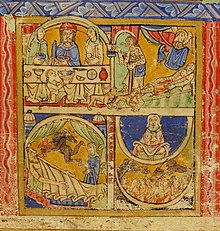

The Eadwine Psalter or Eadwin Psalter is a heavily illuminated 12th-century psalter named after the scribe Eadwine, a monk of Christ Church, Canterbury (now Canterbury Cathedral), who was perhaps the "project manager" for the large and exceptional book. The manuscript belongs to Trinity College, Cambridge (MS R.17.1) and is kept in the Wren Library. It contains the Book of Psalms in three languages: three versions in Latin, with Old English and Anglo-Norman translations, and has been called the most ambitious manuscript produced in England in the twelfth century. As far as the images are concerned, most of the book is an adapted copy, using a more contemporary style, of the Carolingian Utrecht Psalter, which was at Canterbury for a period in the Middle Ages. There is also a very famous full-page miniature showing Eadwine at work, which is highly unusual and possibly a self-portrait.[1]
In addition to this, there is a prefatory cycle of four folios, so eight pages, fully decorated with a series of miniatures in compartments showing the Life of Christ, with parables and some Old Testament scenes. These pages, and perhaps at least one other, were removed from the main manuscript at some point and are now in the British Library, Victoria and Albert Museum (with one each), and two in the Morgan Library in New York.[2]
It was produced around the mid-century, perhaps 1155–60,[3] and perhaps in two main campaigns of work, one in the 1150s and the other the decade after.[4] It was sometimes called the "Canterbury Psalter" in the past, as in the 1935 monograph by M. R. James, but this is now avoided, if only to avoid confusion with other manuscripts, including the closely related Harley Psalter and the Great Canterbury Psalter (or Anglo-Catalan Psalter, Paris Psalter), which are also copies made in Canterbury of the Utrecht Psalter.